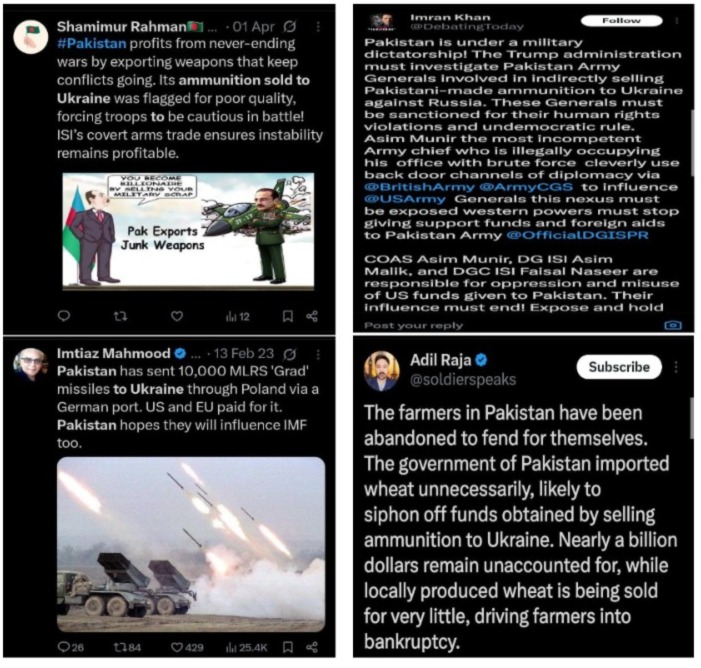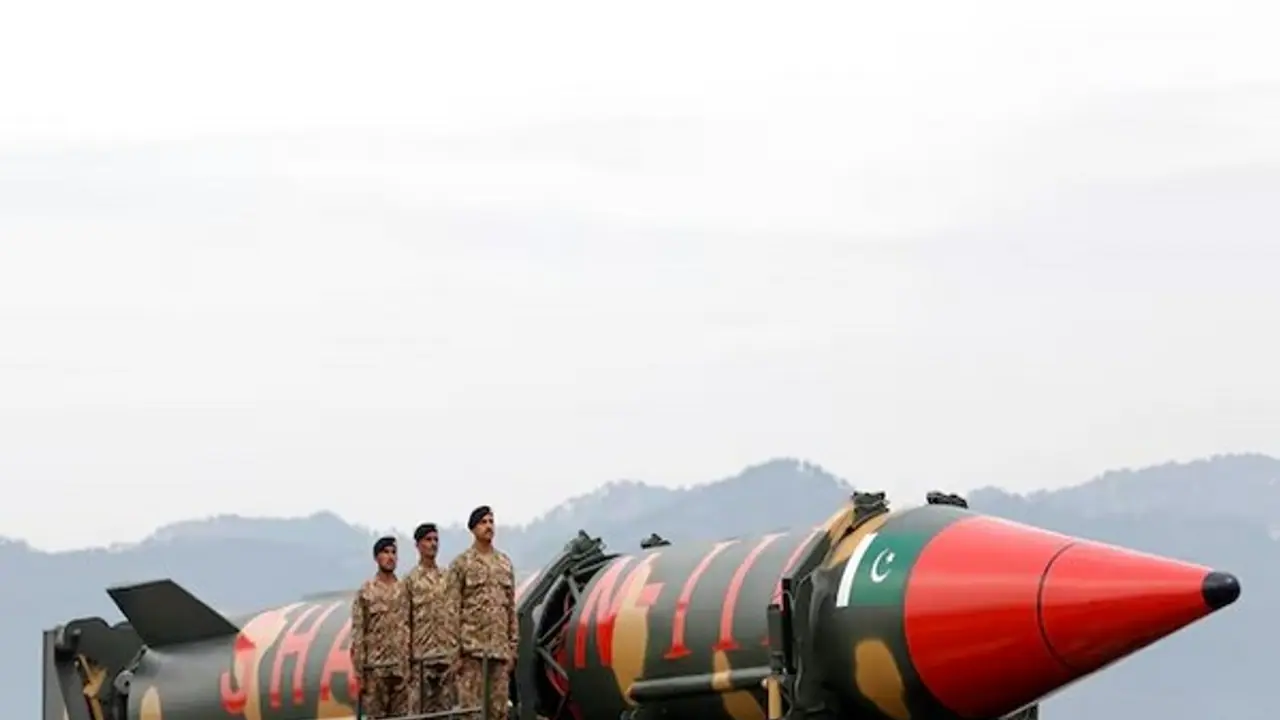Pakistan's military is facing a critical shortage of artillery ammunition, severely limiting its warfighting capabilities to just four days.
Pakistan's military is facing a critical shortage of artillery ammunition, severely limiting its warfighting capabilities to just four days. The shortage is attributed to the country's recent arms deals with Ukraine which have drained its war reserves.

Sources say, the Pakistan Ordnance Factories (POF), which supplies the military, has struggled to replenish supplies amid surging global demand and outdated production facilities. As a result, Pakistan's ammunition reserves can sustain only 96 hours of high-intensity conflict, leaving its military vulnerable.
Pakistan's military doctrine, centred on rapid mobilisation to counter India's numerical superiority, hinges on artillery and armoured units. Without sufficient 155mm shells for its M109 howitzers or 122mm rockets for its BM-21 systems, the army's ability to blunt an Indian offensive is severely compromised.
Arms deal and their implications
The story begins in 2022, as the Russia-Ukraine war ignited a global scramble for munitions. Pakistan, grappling with a spiralling economic crisis—marked by food stampedes and a debt-ridden treasury—saw an opportunity. Despite public claims of neutrality, the Pakistan Ordnance Factories (POF) in Wah Cantt became a key supplier to Ukraine, funnelling millions of rounds of artillery shells, rockets, and small arms ammunition through covert routes.
Reports indicate that between February and March 2023 alone, Pakistan shipped 42,000 122mm BM-21 rockets, 60,000 155mm howitzer shells, and 130,000 122mm rockets, earning $364 million, with 80% of the profits allegedly siphoned to the Pakistan Army’s GHQ in Rawalpindi. By fiscal year 2022-23, arms exports skyrocketed to $415 million, a 3,000% surge from the previous year’s $13 million, largely driven by these deals.
The social media posts on X in April 2025 claimed that critical 155mm artillery shells, vital for Pakistan's artillery-heavy doctrine, were diverted to Ukraine, leaving stockpiles dangerously low.
The POF, designed to meet domestic needs first, struggled to replenish supplies amid surging global demand and outdated production facilities.
However, with the sale of 155 MM ammunition to Ukraine, all 155 mm gun systems, including their self-propelled and MGS artillery, are without adequate stocks of ammunition.

The shortage of artillery ammunition has severe implications for Pakistan's military doctrine, which relies heavily on artillery and armoured units. Without sufficient ammunition, the Pakistan army's ability to blunt an Indian offensive is severely compromised.
Intel source say, due to lack of critical ammunition, Pakistani Military hierarchy is deeply concerned up to some limits of panic. The same was discussed in the Special Corps Commanders Conference on May 2, 2025 among many other things.
A 2022 report noted Pakistan’s defence exports were already modest, with imports ($30.1 million) dwarfing exports ($3.8 million).
Draining reserves further has left Pakistan vulnerable, especially as India’s arms imports grew by 61% from 2015-19 to 2020-24, signalling a widening capability gap.
Earlier, Former Army Chief General Qamar Javed Bajwa acknowledged these limitations, stating that Pakistan lacks the ammunition and economic strength to engage in a prolonged conflict with India.
Sources say, intelligence reports suggested that Pakistan has constructed ammunition depots near the India-Pakistan border in anticipation of potential conflict.
Pakistan sailed its ammunition to distant wars, only to find itself stranded, its arsenals empty, and its defences teetering on the edge. The pursuit of short-term gain has left a long-term wound, one that could prove fatal in the next crisis.
Pakistan's economic crisis, characterised by high inflation, mounting debt, and dwindling foreign exchange reserves, has further impacted the military's operational capabilities. The army has been forced to cut back on rations, suspend military exercises, and halt scheduled war games due to fuel shortages.
Domestic Challenges: Economic Crisis and Military Constraints
Concurrently, Pakistan faces an acute economic crisis characterized by high inflation, mounting debt, and dwindling foreign exchange reserves.
This financial turmoil has severely impacted the military's operational capabilities.
The Pakistan Army has been compelled to cut back on rations, suspend military exercises, and halt scheduled war games due to fuel shortages. Former Army Chief General Qamar Javed Bajwa has acknowledged these limitations, stating that Pakistan lacks the ammunition and economic strength to engage in a prolonged conflict with India.
The Pakistan military’s profiteering has fuelled resentment, with critics decrying the sacrifice of national security for dollars. The irony is that while Pakistan’s generals cashed in, the nation’s ability to deter or fight a conventional war—particularly against India—has crumbled.
Four days of combat capacity is not just a statistic; it’s a death knell for a military that prides itself on resilience. In this high-stakes game, Pakistan sailed its ammunition to distant wars, only to find itself stranded, its arsenals empty, and its defences teetering on the edge. The pursuit of short-term gain has left a long-term wound, one that could prove fatal in the next crisis.
Strategic Repercussions
The depletion of ammunition reserves, coupled with economic constraints, has significantly reduced Pakistan's military readiness.
Intelligence reports suggest that Pakistan has constructed ammunition depots near the India-Pakistan border in anticipation of potential conflict.
However, the effectiveness of these measures is questionable given the current shortages. The impact of these arms transfers on Pakistan’s own military readiness has raised concerns. Some analysts speculate that Pakistan’s ammunition reserves have dwindled to the point where it may struggle to sustain a prolonged conflict, potentially limiting its ability to fight beyond four days in a full-scale war scenario.
Pakistan repeated attempt of cyberattacks
Meanwhile, Pakistan has been left red-faced on another front. Pakistan-sponsored hacker groups such as "Cyber Group HOAX1337" and "National Cyber Crew" made unsuccessful attempts to breach some Indian websites on May 1. These hacking efforts were promptly identified and neutralised by cybersecurity agencies.
Among the latest provocations, the websites of Army Public School Nagrota and Sunjuwan were targeted and attempted to be defaced with messages mocking the victims of the recent Pahalgam terror attack. In another incident, a website catering to ex-servicemen's healthcare services was defaced, signalling Pakistan's growing frustration.
There have been repeated attempts made by hackers operating from Pakistan to attack Indian websites having linkages to children, old age veterans and other innocent people. Resorting to attacking veterans' and families' platforms reflects another low by Pakistan and their continuous attempts to operate in unethical ways.
The hacking of the Army Institute of Hotel Management's website and Indian Air Force veterans further illustrates the Pakistani establishment's intent to provoke and escalate tensions in the digital battlespace.
These brazen cyberattacks are part of a broader pattern of provocation by Pakistan, which has long employed terrorism and information warfare against India.
(With inputs from ANI)


